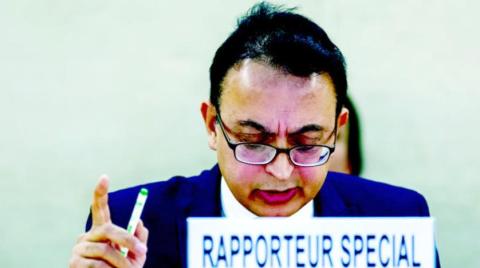
Fiji has won an intense and secretive geo-political battle to become the first Pacific island nation to win presidency of the United Nations Human Rights Council, but its ascension has come with demands from critics for it to address systemic rights abuses at home.
Overcoming last-minute challenges from Bahrain and Uzbekistan, both backed by China, Russia and Saudi Arabia, Fiji decisively won 29 out of 47 votes to take control of the powerful and influential global body.
The country’s chief diplomat in Geneva, ambassador Nazhat Shameem Khan, will assume the presidency with immediate effect in an important year for the 47-member council, with China and Russia set to return as members, as well as expected US re-engagement under new president Joe Biden.
Fiji’s prime minister, Frank Bainimarama, said: “Fiji’s UN human rights council leadership comes at a critical time for humanity, as the climate emergency threatens human rights on a global and generational scale.
“Ambassador Khan is well suited to help steer us towards a future of justice, decency, and dignity for all peoples.”
A former high court judge seen as closely allied to the Bainimarama government, Khan takes up the role at a time of fierce competition between some of the council’s member states and an intensifying Sino-American rivalry.
The council has been instrumental in highlighting abuses in Myanmar, Venezuela, the Philippines, Belarus, Syria, and Yemen, as part of its mission to to “promote and preserve human rights around the world”, but it has also attracted criticism over its membership, with countries with poor rights records like Saudi Arabia, Libya, Sudan and Somalia taking seats.
Observers told the Guardian that China, Russia, and Saudi Arabia appeared to be trying to install a friendly candidate country as president to avoid having their own human rights records scrutinised, described by one analyst as a case of larger countries “shoving small Pacific states aside”.
But civil society groups in Fiji have called on the government there – with its ascension to the presidency of the council – to address its own chequered rights record.
There is particular concern about police brutality, media freedom and restrictive legislation, such as the sedition provisions in the Crimes Act and the controversial Public Order Act, described as draconian by civil society groups and opposition MPs.
In November, the Guardian revealed 400 charges of serious violence were laid against police officers in Fiji between May 2015 and April 2020, including for murder, manslaughter, rape, and aiding prisoners to escape.
A coalition of human rights groups, including the Citizens Constitutional Forum, Fiji Women’s Rights Movement, and Social Empowerment and Education Program (SEEP), has called on the Fijian government to “act to ensure that human rights and the principles of equality and justice are upheld across all sectors”.
“As the president of the UNHCR, Fiji now faces global scrutiny on our human rights obligations. This is a welcome opportunity for Fiji to reflect on our progress and the existing human rights concerns that need to be addressed,” chair of the Fiji ngo Coalition on Human Rights Nalini Singh said.
“We are at the world stage taking a strong stance on human rights but we must walk the talk here at home and set the example.”











